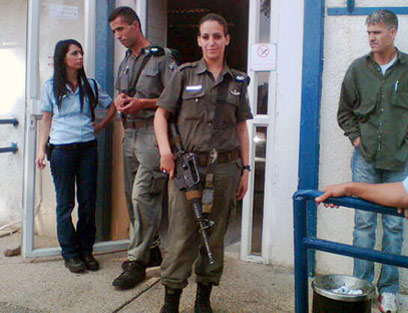
Police launch inquiry into clashes with Druze
Druze community leaders convene urgent meeting following clashes in Galilee town of Peki'in which left more than 30 injured; demand commission of inquiry into incident, personal apology from Prime Minister Olmert for security forces' entry into prayer house
Twelve of those wounded in the clashes that took place in the Galilee town of Peki'in between local residents and police officers remain hospitalized as of late Tuesday night. Meanwhile the police have already launched an inquiry into the controversial incident and investigators pointed to a series of difficult questions, particularly pertaining to the use of live fire.
Leaders of the Druze community asked the State to appoint a commission of inquiry into the clashes and to prosecute police officials responsible for the violent incident.
The Druze leaders also plan to demand an apology from Prime Minister Ehud Olmert for the entry of police officers into the town's prayer house.
Internal Security Minister Avi Dichter announced that "anyone who laid a hand on a police officer during the Peki'in will be dealt with severely and according to the law."
Dichter, who is currently visiting the United States, received updates on the events from Police Commissioner Dudi Cohen. He promised that the citizens' claims against the police will be examined by a police committee and by the Police Investigation Unit.
The police commissioner met with the Druze leaders Tuesday afternoon and listen to their complaints.
Thirty-one people were injured in the clashes, which broke out early Tuesday as Peki'in residents protested the installation of a cellular antenna in the the town. Police and Border Guard officers, local residents and Magen David Adom paramedics were among the injured.
Dr. Jack Stolero, who runs the emergency room at the Nahariya hospital, told Ynet, "There is one civilian who sustained serious wounds among the injured, two in moderate condition, and eight in light condition.
"Three of the injured are undergoing surgery, suffering from gunshot wounds. Among the police officers, one is in moderate condition after losing one of his fingers."
Major-General Shimon Koren, commander of the police's Northern District, said Tuesday afternoon that the police officers who fired live ammunition at the demonstrators were in danger.
"It is clear that the instructions given to police officers are not to open fire at demonstrators, but this was not a demonstration. Their lives were in risk," he said, adding that the issue would be investigated by the Police Investigation Unit.
Koren addressed the claims that the police did not achieve its goal, as they did not capture the young men they sought to arrest.
"The police force entered the community in order to carry out the detentions, but its mission changed due to the circumstances… We have no considerations of color, race or gender. We operate everywhere as needed."
Injured man's father: Why do they shoot at us?
Mahmoud, whose son was seriously injured, said, "My son sustained gunshot wounds. There were some 200 police officers there who treated us like dogs. They did not try to solve the problem, but rather to kill and massacre us.
"Everyone says there is a blood connection between the Jews and the Druze, but I find it difficult to understand how we reached a situation in which police officers fire at civilians in the State of Israel without any distinction."
Six Border Guard officers and a policewoman hurt in the clashes arrived at the Ziv Medical Center in Safed. The emergency room manager, Dr. Hussein Amar, reported the seven were in light conditions and suffered from cuts and bruises to their head and limbs.

Liat Douadi, policewoman who was released (Photo: Ahiya Raved)
Hani Khir, a Peki'in resident who was injured in the clashes and hospitalized at the Nahariya hospital, told Ynet, "I heard noise and a commotion and came out of the house. I saw civilians and Border Guard officers clashing.
"Suddenly someone pulled me by the hand and I found myself inside the clashes. Some of the police officers began beating me, causing bruises in my stomach and head. I don’t know how long it lasted, but I eventually ended up in this hospital. I still don’t understand why they hit me.
"Every Druze person should think twice whether to send his son to defend the borders of the State, which shamelessly sends police officers and Border Guard soldiers to kill innocent civilians," he added.
Local council head Muhammad Kheir said Tuesday afternoon that had the police consulted the town leaders and updated them on the young men wanted for questioning, the commotion would have been prevented.
According to Kheir, the town residents have been negotiation for months with the owner of the land on which the cellular device was installed, but to no avail.
Addressing the violent clashes, Kheir claimed that the commotion began after the police entered the Druze prayer house and fired tear gas and rubber bullets. He added that the policewoman who remained in the town was not taken hostage.
"She sat at the prayer house with the police officers who protected her and with people, and received coffee and water. She was never in danger. On the contrary, she was safer inside than outside."
Sharon Roffe-Ofir, Hagai Einav and Ahiya Raved contributed to this report










